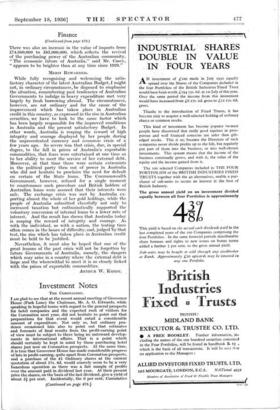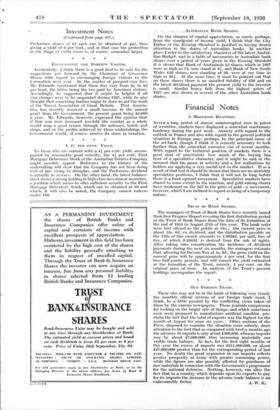Investment Notes
THE CORONATION.
I Alit glad to see that at the recent annual meeting of Grosvenor House (Park Lane) the Chairman, Mr. A. 0. Edwards, while speaking in hopeful terms with regard to the general 'prospects for hotel companies and the expected rush of visitors for the Coronation next year, did not hesitate to point out that preparations for that event would entail a considerable amount of expenditure. Not only so, but ordinary pru- dence occasioned him also to point out that estimates and forecasts of final results from the profit-earning point of view must be subject to there being no untoward develop- ments in international affairs. That is a' point which should certainly be kept in mind by those purchasing hotel shares just now on Coronation prospects.' At the same time, it is true that Grosvenor House has made considerable progress of late in profit-earning, quite apart from Coronation prospects, and a purchase of the 21 Ordinary shares at the current quotation of about 17s. 6d. would scarcely seem to be a very hazardous operation as there was a fair margin of profits over the amount paid in dividend last year. At their present price the shares, on the basis of the last dividend, give a yield of about 51 per cent. Incidentally, the 6 per cent Cumulative (Continued on page 478.)
Investment Notes
(Continued from page 477.) Preference shares of £1 each can_ be obtained at par, thus giving a yield of 6 per cent:, and in that case the protection in the shape of extra cover is, of course, somewhat- larger.
ENCOURAGING THE FOREIGN- VISITOR.
incidentally, I think there is a good deal to b'e said for the suggestions put forward by the Chairman of Grosvenor House with regard to encouraging foreign visitors to the Coronation next year. In the matter, of passport-visa fees, Mr. Edwards Mentioned that those fees vary from 8s. to £2 per head, the latter being the tax paid by American visitors. Accordingly, he suggested that it might be helpful if all visa charges were to be suspended during 1937, while he also thought that something further might be done to aid the work of the Travel Association of Great Britain. That Associa- tion has recently received a small increase in the annual grant from the Government, the present grant being £5,000 a year. Mr. Edwards, however, expressed the opinion that if that sum were increased ten-fold the country as a whole would reap a good return through the railways, hotels and shops, and on the profits achieved by those undertakings the Government would, of course, receive its share in taxation.
A 41 PER CENT. YIELD.
To those who are content with a 41 per cent. yield, accom- panied by reasonably good security, the 4f per cent. First Mortgage Debenture Stock of the Australian Estates Company might possibly appeal. Reference to the history of the undertaking will-show that the Company has not been doing well of late owing to droughts, and the Preference dividend is actually in arrears. On the other hand, the latest balance- sheet shows a strong holding in high-class investment securities, a position which seems to offer sufficient security to the First Mortgage Debenture Stock, which can be obtained at 99 and which, it will also be noted, the Company cannot redeem under 110.
AUSTRALIAN JRANK SHARES.
On the- chances of capital appreciation, as much, perhaps, from the standpoint of income yield, I think that the City editor of the Evening Standard is justified in having drawn ittiention to the shares of Australian banks. In, another Place I refer to the satisfactory chariefer of the latest Austri- lian Budget, and in a table of movements in Australian baiik shares over a period of years given in the Evening Stands & it is shown that flank of Australasia. £5 shares, which in 1,92'7 were as high as 15, now stand at 91, and Bank of New South Wales £20 shares, now standing at• 26, were at one time as high as 481. At the same time, it must be pointed out that on these shares there is an uncalled liability of £20 and pn the latest dividend payment the present yield to the investor is small. Similar heavy falls from the highest priceS of 1927 are alsO shown in several of the other Australian bank shares.











































 Previous page
Previous page